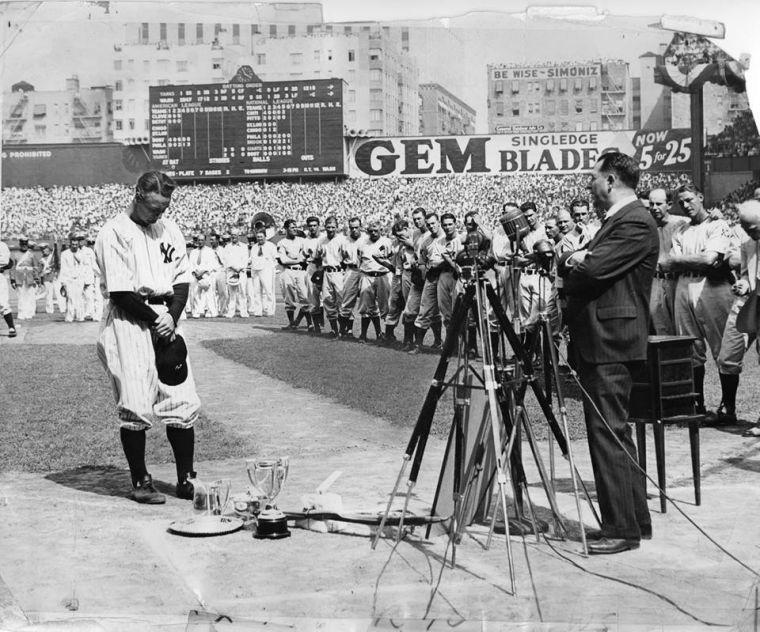75 years ago, on July 4, 1939, Lou Gehrig stood on the infield grass at Yankee Stadium, with photographers surrounding him from every direction and microphones from numerous radio stations at his mouth, to officially retire from baseball. Just three weeks earlier, he had been diagnosed with ALS, and just 5 weeks prior to that, he had played in his last of 2,130 straight games.
It is difficult for the modern fan to understand just how prevalent baseball was on the national conscious in 1939. The NFL was lucky to draw 10,000 fans to a game. The NBA didn’t exist yet and the NHL was still a largely provincial form of entertainment. Baseball was inescapable during summers in Depression-Era America, especially in New York, so everyone was definitely tuned into the 4th of July Yankees game, and that’s a good thing, because Gehrig’s words are among the most profound ever spoken by an athlete.
Fans, for the past two weeks you have been reading about the bad break I got. Yet today I consider myself the luckiest man on the face of this earth. I have been in ballparks for seventeen years and have never received anything but kindness and encouragement from you fans.
Look at these grand men. Which of you wouldn’t consider it the highlight of his career just to associate with them for even one day? Sure, I’m lucky. Who wouldn’t consider it an honor to have known Jacob Ruppert? Also, the builder of baseball’s greatest empire, Ed Barrow? To have spent six years with that wonderful little fellow, Miller Huggins? Then to have spent the next nine years with that outstanding leader, that smart student of psychology, the best manager in baseball today, Joe McCarthy? Sure, I’m lucky.
When the New York Giants, a team you would give your right arm to beat, and vice versa, sends you a gift – that’s something. When everybody down to the groundskeepers and those boys in white coats remember you with trophies – that’s something. When you have a wonderful mother-in-law who takes sides with you in squabbles with her own daughter – that’s something. When you have a father and a mother who work all their lives so you can have an education and build your body – it’s a blessing. When you have a wife who has been a tower of strength and shown more courage than you dreamed existed – that’s the finest I know.
So I close in saying that I might have been given a bad break, but I’ve got an awful lot to live for.
Gehrig, retiring after receiving a very difficult diagnosis, referred to himself as the luckiest man on the face of the earth, on the basis that the fans allow him to him to play baseball for a living. He’s enamored with the idea that the arch-rival New York Giants would give him a gift on the day he retires. He’s claiming how lucky he is just to be associating with his manager and teammates on a daily basis.
Wouldn’t it be great if that was the case more often today? Too many athletes seem to forget just how fortunate they are. Barry Bonds used to claim that he did not care what fans thought of him, asking them to “cheer me, boo me, do whatever you want.” This was while Barry was cheating the public out their hard earned money, as they paid to see a steroid-fueled caricature of Barry Bonds, as opposed to the real thing. Athletes disrespect fans in other ways. Aaron Hernandez, Michael Vick, Alex Rodriguez, Manny Ramirez, Gilbert Arenas, Oscar Pistorius, Marion Jones, Lance Armstrong, Tiger Woods, and many other great pro athletes have managed to alienate their fans by betraying them with either forms of cheating, off the field crimes, or both.
The professional athlete has become a sort of runaway train. Sure, there are some great guys playing right now, real class acts, but there are too many men and women that forget that they’re only able to play a game for a living because of the fans. If we didn’t watch the games, or buy tickets and T shirts, or call radio stations or read newspapers, then all of the pros who go to Vegas for the weekend or spend $100,000 in the strip club in one night or date super-models would be regular old guys working regular old jobs, and Gehrig understood that. That’s why he was such a hero to so many New Yorkers, even after his playing days ended. He felt as though he owed it to the public to play, and that’s part of why he played 2,130 straight games and gave such a heartfelt address.
Gehrig comes from a different era, when athletes were actually a part of their communities and communities were more involved with their athletes. Willie Mays used to play ball with kids on his way to games, and before the 1948 NFL Championship game, fans came to the stadium in Philadelphia early to help clear snow off of the field. That’s a far cry from where we are now, with Lebron James poised to become the first billionaire pro-athlete. Hopefully more of the athletes today discover Gehrig’s words, and they’ll begin to understand that they really are the luckiest men on the face of the earth, and not save that redirect for just the ESPYs or championship parades.
75 years later, today’s pros could take a hint from Lou Gehrig
July 4, 2014





















































